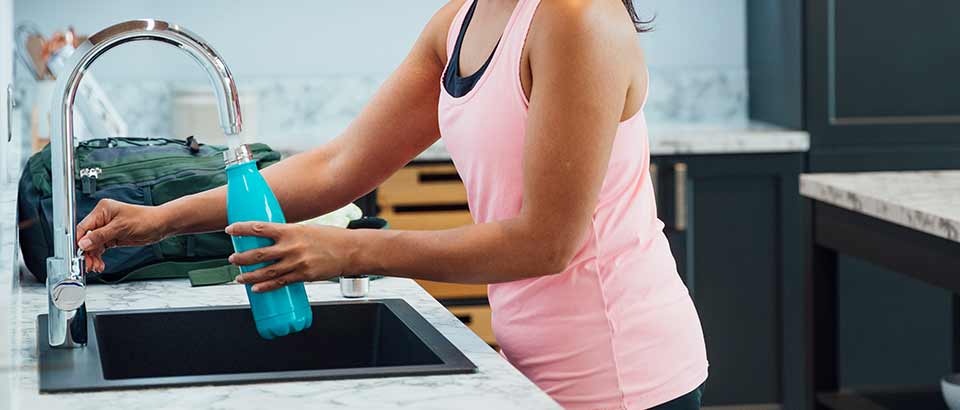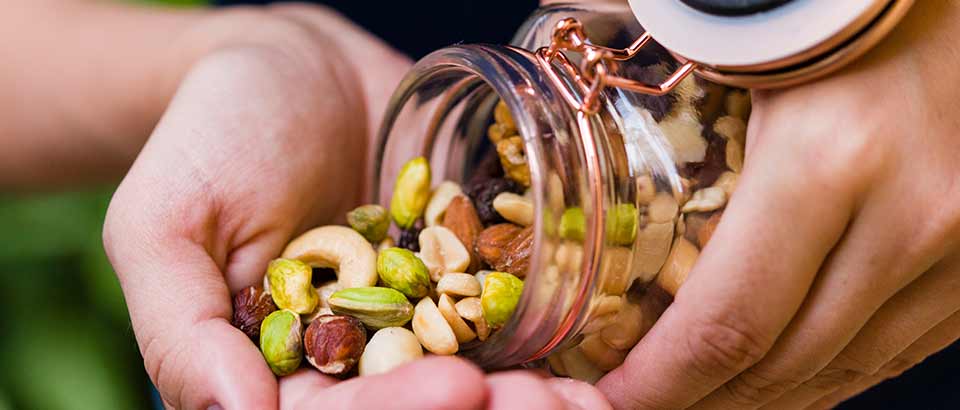May 17, 2021
When you hear the word dehydration, you might think of someone being extremely thirsty. While increased thirst is certainly a possible signal that you need to increase your fluid intake, there are many other symptoms of dehydration that may not be as obvious. Read on to learn about dehydration and 6 common signs that you might be dehydrated.
What is Dehydration?

First things first: let’s break down what it means to be dehydrated. Dehydration happens when you lose more fluids than you consume. Although dehydration is often associated with hot weather, you can be dehydrated at any time of year and in any weather condition. Dehydration is also more common – and more serious – for young children, who may not understand the importance of feeling thirsty, and older adults, whose medications, such as diuretics, may increase the risk of becoming dehydrated. Other common causes can include sweating heavily, severe diarrhea and vomiting. Let’s jump into some of the signs you may be dehydrated.
Signs of Dehydration
1. Increased Thirst
While this symptom might seem like an obvious sign of dehydration, it’s worth noting that not every person who experiences dehydration feels really thirsty, especially young children and the elderly. To prevent dehydration, the National Academy of Sciences recommends that healthy men between 19 and 50 years of age should drink an average of 101 oz. of water, or 13 cups of water per day, and women between these same ages should drink 74 oz., or 9 cups of water per day.1 Keep in mind that each person requires a different amount of fluids based on personal health, physical activity and climate, among other factors – that’s why it’s always a good idea to talk to a health care provider before making changes in your drinking habits. And if water isn’t your favorite, that’s okay too – many foods and other beverages can help you stay hydrated in addition to water, including fruits, veggies and milk.
2. Fatigue
Feeling tired and sluggish even after coffee? Surprisingly, dehydration may be the reason. Water helps regulate many bodily functions, including sending nutrients and oxygen to our cells and maintaining our levels of electrolytes, which both affect our perceived energy levels. When you’re dehydrated, you may feel more tired because these – and other important functions – aren’t running as smoothly. In fact, dehydrated individuals who lost between 2-3% of their body fluid weight reported feeling nearly twice as tired as those who were hydrated in one study. 2
3. Dry Mouth
There’s nothing worse than finishing a workout and feeling like you need to drink a whole gallon of water because your mouth is so dry. Okay…maybe there are worse things, but the point is that dry mouth is another sign of dehydration. While the feeling itself is uncomfortable, having a dry mouth for prolonged amounts of time can also lead to other problems, including gingivitis, also known as gum disease, tooth decay and mouth infections. To keep your dentist – and mouth – happy, be sure to pack a water bottle whenever you’re on the go to stay hydrated.
4. Bad Breath
Just as our mouths can be dry, they can also be less than minty fresh. And as you’ve probably guessed, dehydration may have something to do with it. Saliva (a.k.a. spit) helps your mouth break down food for further digestion and clean out bacteria and other unwanted substances, but if you’re dehydrated, you may not be able to make enough saliva to do the job, which allows bacteria to grow more quickly and contribute to that all-too-unpleasant smell. Instead of reaching for mouthwash next time your breath needs a tune-up, try grabbing a water bottle and see if it helps kick the stench, too.
5. Trouble Urinating
While everyone uses the bathroom a different number of times per day, if you haven’t had to use the bathroom very often, it may be because you don’t have enough fluids in your body to urinate normally. Similarly, if you use the bathroom and notice that your urine is a dark yellow color, you also may be dehydrated. Urine removes waste from the body that has been filtered out by the blood, making it an essential function to keep in check. Here’s a good rule of thumb to keep in mind: if your urine is clear or light yellow, you’re properly hydrated. If your urine is bright yellow or darker, reach for some water or another hydrating beverage.
6. Feeling Hungry
 It’s one thing to feel hungry after not eating for hours, but it’s another to feel hungry only half an hour after finishing lunch. As it turns out, the same part of your brain that alerts you to hunger tells you when you’re thirsty, which can lead to overlapping signals, or sometimes getting the signals mixed-up altogether. If you’ve eaten within the past 2-3 hours, try reaching for a cold glass of water rather than that afternoon snack and see if that rumbling tummy settles down.
It’s one thing to feel hungry after not eating for hours, but it’s another to feel hungry only half an hour after finishing lunch. As it turns out, the same part of your brain that alerts you to hunger tells you when you’re thirsty, which can lead to overlapping signals, or sometimes getting the signals mixed-up altogether. If you’ve eaten within the past 2-3 hours, try reaching for a cold glass of water rather than that afternoon snack and see if that rumbling tummy settles down.
Severe Dehydration Symptoms
While many dehydrated people recover just by drinking ample fluids, dehydration can be a very serious problem that requires more advanced medical treatment. It’s important to recognize not only common signs of dehydration, but the signs of serious dehydration that require immediate attention:
- Extreme fatigue
- Confusion
- Dizziness
- No urination for 24 hours
- A weak or rapid pulse
Seek emergency medical treatment if you or someone else displays these severe symptoms, especially if you are unable to replenish your fluids by drinking.
Also, it’s important to note that these symptoms can be signs of other, related health problems – not just dehydration. Whether you’re looking to stay hydrated after a great workout or simply avoid becoming dehydrated throughout the day, it’s a good idea to recognize the signs of dehydration and make small changes that can help you stay hydrated.
References:
1 Dietary Reference Intakes: Water, Potassium, Sodium, Chloride, and Sulfate. Last updated February 11 2004. Accessed February 26, 2018.
2 American Physiological Society: Effect of water deprivation on cognitive-motor performance in healthy men and women. Last updated July 1 2005. Accessed March 30, 2021.
